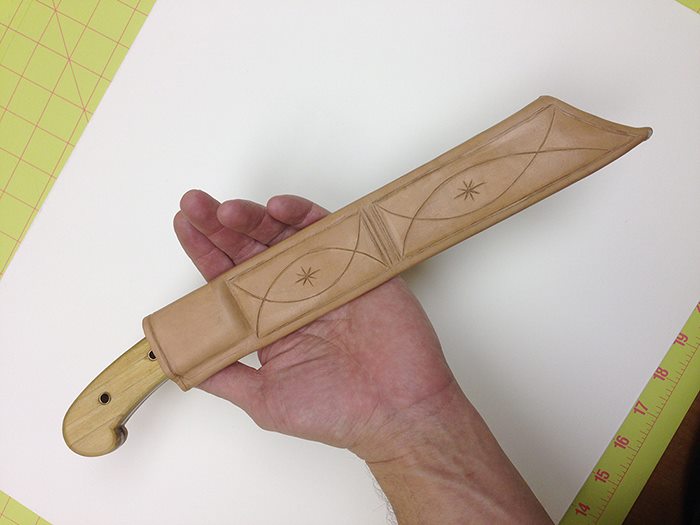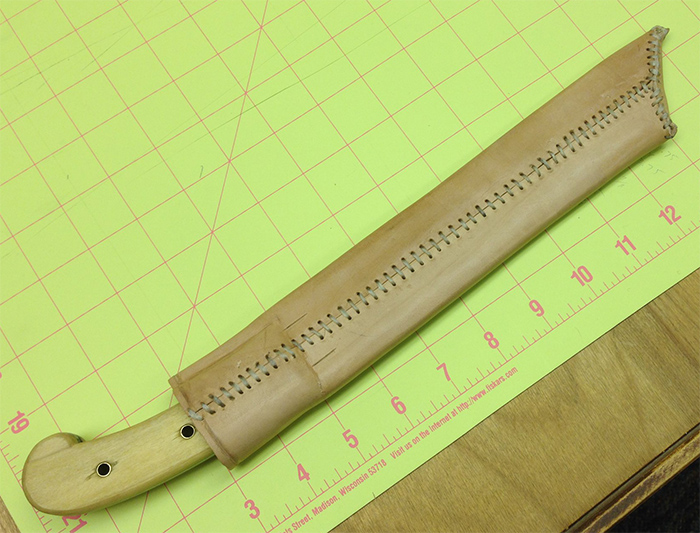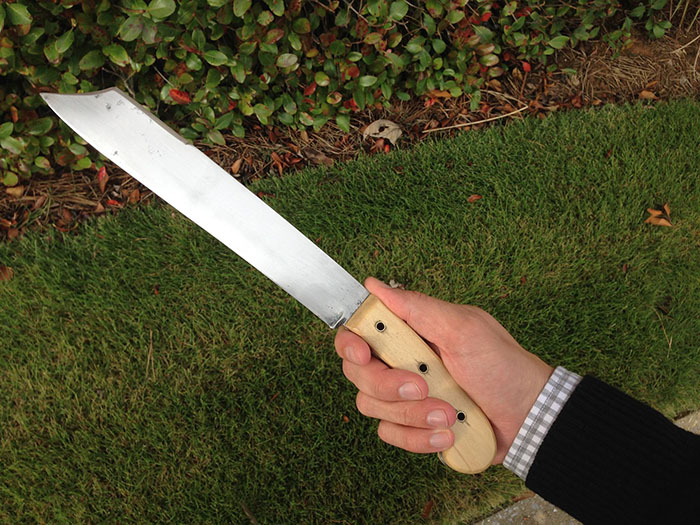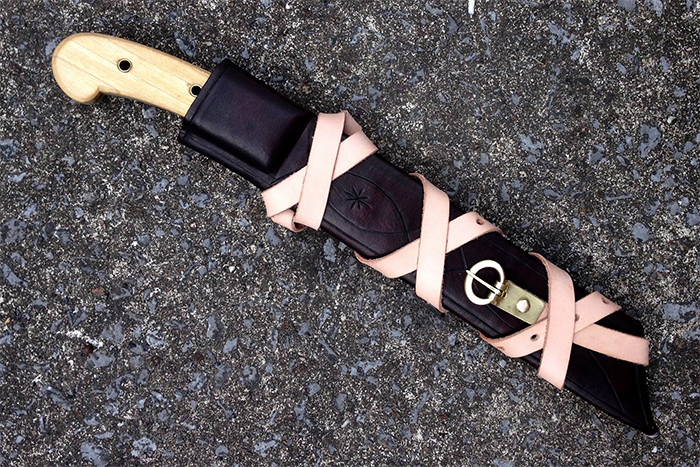I'm interested in trying to make a 2-layer leather sheath, medieval style.
But I'm not clear on how this was done. I am particularly unclear about how to blend the inner and out layers around the mouth of the sheath.
Can anyone educate this old dog?
I looked at this thread, but it doesn't answer my questions.
http://myArmoury.com/talk/viewtopic.25533.html
on grounds that I really need to stop procrastinating, and get on with doing the same on a set I've got here to do, if you'd like I can show a set of photos of stages of the process over the next day or so?
Means I finally have no excuse to keep putting it off!
generally speakin though there's two or three variants I'm aware of.
the first is really simple - just have the two layers butt up against each other. ==== - like that,
the second is pretty simple, its just to have the two layers sewn together: =I== - like that, with I being the thread.
and the third is to skive and fold round the outer layer so its a smooth top: ᓕI== like that. (oh, thank you unicode symbols!)
Means I finally have no excuse to keep putting it off!
generally speakin though there's two or three variants I'm aware of.
the first is really simple - just have the two layers butt up against each other. ==== - like that,
the second is pretty simple, its just to have the two layers sewn together: =I== - like that, with I being the thread.
and the third is to skive and fold round the outer layer so its a smooth top: ᓕI== like that. (oh, thank you unicode symbols!)
Thank you, I would greatly appreciate your guidance
I'd also be very interested in seeing. Thanks!
My method:
I use thin craft foam cut large and wrapped snugly around blade and far up the handle as I want. I put tape around this to hold it together, then remove from knife, cut down the middle of one flat side and remove the leftover bits of foam. That will give you a close pattern for the internal sheath, but proceed carefully, especially if you have an asymmetrical blade--remember that you want the smooth side of the internal sheath next to the blade and the seam on the front of the knife. You can leave the mouth end of the pattern long/unfinished at this point, but you'll want to shape the tip of the pattern pretty carefully. Just leave yourself a slight margin there, to trim and shape the final sheath.
Use the pattern to cut the leather, leaving a bit of margin to allow for shrinkage of wet leather.
Wrap knife tightly in self-clinging plastic wrap, cover with wet leather (keep the seam up front) tape around the sheath in a few places to keep it in place as it dries. when it's about halfway dried, use the barrel of a pen (rounded end Sharpie is perfect) or something similar to smooth and shape the leather to match the blade and handle.
When the internal sheath is dry, put a stitch at mouth, middle and tip, then repeat the process described above–this time putting the seam at the back of the knife and adding whatever holes/channels you want for suspension. Dry it in place over the internal sheath.
While the external sheath is drying, put couple of stitches in the internal sheath at top middle and bottom.
When the external sheath is dry, remove internal sheath.
Pierce and stitch external sheath.
Apply a light coat of original Titebond wood glue on the outward-facing side of the internal sheath and and re-insert into external sheath. Insert knife and rub all over to make sure the sheath layers are in contact.
When all is dry, trim the mouth of the sheath so that the layers are perfectly flush. I usually chamfer the inside edge of the mouth to ease insertion of the knife. Then burnish with a pen barrel around the mouth to blend the layers.
Dye/wax and add suspension.
I use thin craft foam cut large and wrapped snugly around blade and far up the handle as I want. I put tape around this to hold it together, then remove from knife, cut down the middle of one flat side and remove the leftover bits of foam. That will give you a close pattern for the internal sheath, but proceed carefully, especially if you have an asymmetrical blade--remember that you want the smooth side of the internal sheath next to the blade and the seam on the front of the knife. You can leave the mouth end of the pattern long/unfinished at this point, but you'll want to shape the tip of the pattern pretty carefully. Just leave yourself a slight margin there, to trim and shape the final sheath.
Use the pattern to cut the leather, leaving a bit of margin to allow for shrinkage of wet leather.
Wrap knife tightly in self-clinging plastic wrap, cover with wet leather (keep the seam up front) tape around the sheath in a few places to keep it in place as it dries. when it's about halfway dried, use the barrel of a pen (rounded end Sharpie is perfect) or something similar to smooth and shape the leather to match the blade and handle.
When the internal sheath is dry, put a stitch at mouth, middle and tip, then repeat the process described above–this time putting the seam at the back of the knife and adding whatever holes/channels you want for suspension. Dry it in place over the internal sheath.
While the external sheath is drying, put couple of stitches in the internal sheath at top middle and bottom.
When the external sheath is dry, remove internal sheath.
Pierce and stitch external sheath.
Apply a light coat of original Titebond wood glue on the outward-facing side of the internal sheath and and re-insert into external sheath. Insert knife and rub all over to make sure the sheath layers are in contact.
When all is dry, trim the mouth of the sheath so that the layers are perfectly flush. I usually chamfer the inside edge of the mouth to ease insertion of the knife. Then burnish with a pen barrel around the mouth to blend the layers.
Dye/wax and add suspension.
Last edited by Sean Flynt on Tue 22 Jan, 2019 9:48 am; edited 2 times in total
this shows the front and back of a two-layer sheath made as described above.
 Attachment: 37.59 KB
Attachment: 37.59 KB

 Attachment: 246.09 KB
Attachment: 246.09 KB



| Sean Flynt wrote: |
| this shows the front and back of a two-layer sheath made as described above. |
Sean, that project looks fantastic.
| Nathan Robinson wrote: | ||
Sean, that project looks fantastic. |
Thanks! It taught me to back the scales with scrap wood when drilling to prevent blowouts, for one thing. It was also a challenge to deal with that odd-shaped point. I don't know if my sheath tip solution is historical, but it's simple and functional.


Sean Flynt wrote
Well then it almost certainly is. Besides I do a very similar thing.
You showed this project a year or two back and it still looks great. My personal outlook is that if you look back on a project 2 or 3 years later and it still looks good, then it is good. This is good.
I simply wrap the leather around the blade, mark, remove and cut.
I then replace the liner onto the blade and do the same with a second piece.
The two pieces are then laid over each other and I awl three holes top and bottom and stick the layers together
The double layer is then wrapped back around and stitched up through the outer leather.
Most knife sheaths were historically single layer and thin and often sheep; so pretty much everything we would not want in sheath leather from a modern point of view. Double layer existed and in fact Cowgill et al refer to the punched awl holes through some of their sheaths, though from memory I think they didn't mention they were for liners, but I took this to be the case.
It is also interesting that there is a lovely picture in their book that shows a knife seller selling bare knives and empty sheaths, but not associated directly with each other, suggesting you bought a knife and then bought a sheath that (approximately, presumably) fitted it.
On a side note, the book also has a great 14thC picture of a knife seller and it may be the same one, where he is tending his stall and in front on the pavement/sidewalk are a couple copulating for no apparent reason. Odd picture
Tod
| Quote: |
| I don't know if my sheath tip solution is historical, but it's simple and functional. |
Well then it almost certainly is. Besides I do a very similar thing.
You showed this project a year or two back and it still looks great. My personal outlook is that if you look back on a project 2 or 3 years later and it still looks good, then it is good. This is good.
I simply wrap the leather around the blade, mark, remove and cut.
I then replace the liner onto the blade and do the same with a second piece.
The two pieces are then laid over each other and I awl three holes top and bottom and stick the layers together
The double layer is then wrapped back around and stitched up through the outer leather.
Most knife sheaths were historically single layer and thin and often sheep; so pretty much everything we would not want in sheath leather from a modern point of view. Double layer existed and in fact Cowgill et al refer to the punched awl holes through some of their sheaths, though from memory I think they didn't mention they were for liners, but I took this to be the case.
It is also interesting that there is a lovely picture in their book that shows a knife seller selling bare knives and empty sheaths, but not associated directly with each other, suggesting you bought a knife and then bought a sheath that (approximately, presumably) fitted it.
On a side note, the book also has a great 14thC picture of a knife seller and it may be the same one, where he is tending his stall and in front on the pavement/sidewalk are a couple copulating for no apparent reason. Odd picture
Tod
Page 1 of 1
You cannot post new topics in this forumYou cannot reply to topics in this forum
You cannot edit your posts in this forum
You cannot delete your posts in this forum
You cannot vote in polls in this forum
You cannot attach files in this forum
You can download files in this forum
All contents © Copyright 2003-2006 myArmoury.com — All rights reserved
Discussion forums powered by phpBB © The phpBB Group
Switch to the Full-featured Version of the forum
Discussion forums powered by phpBB © The phpBB Group
Switch to the Full-featured Version of the forum